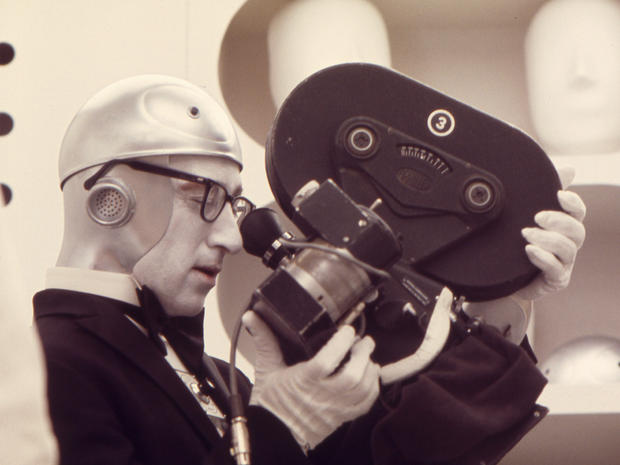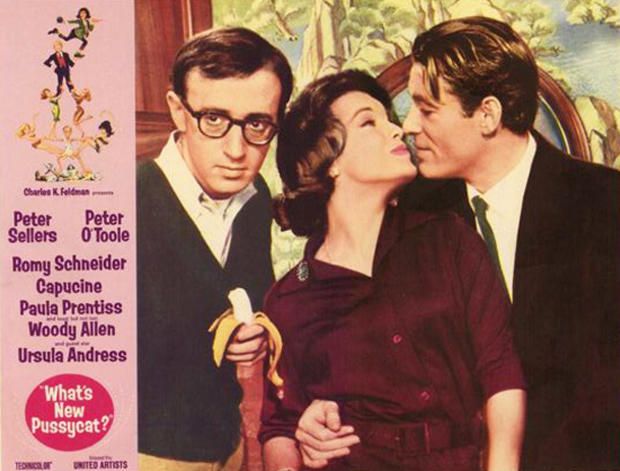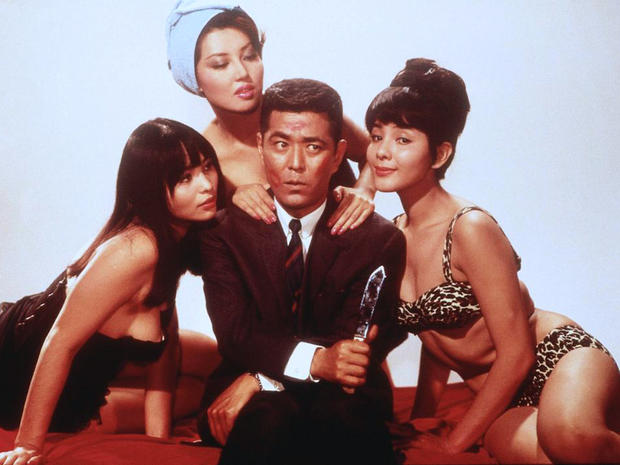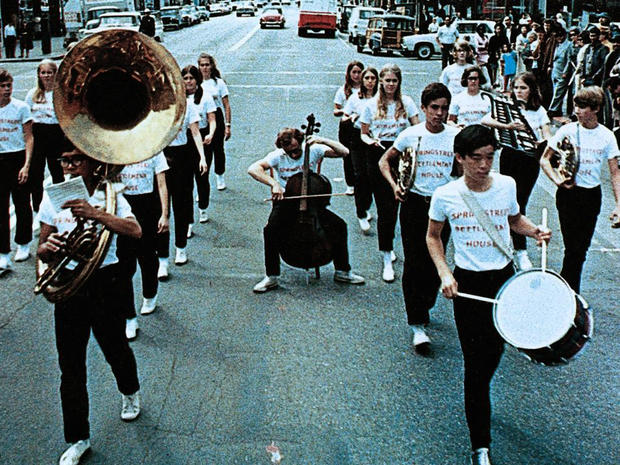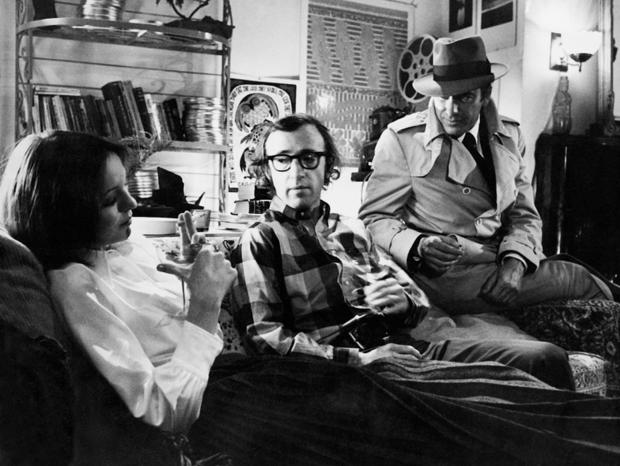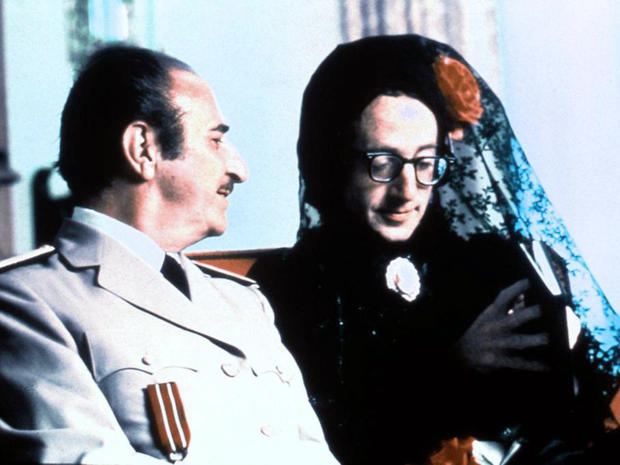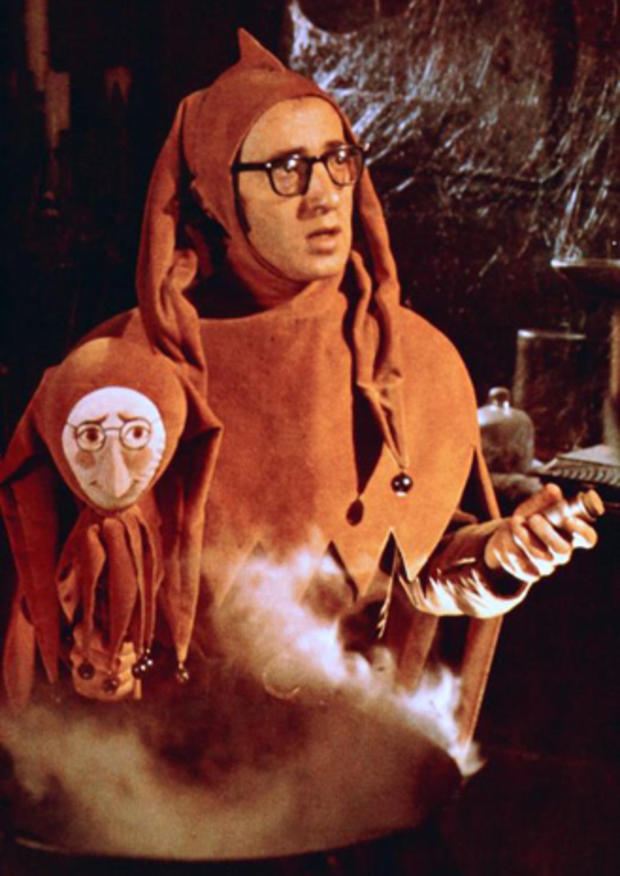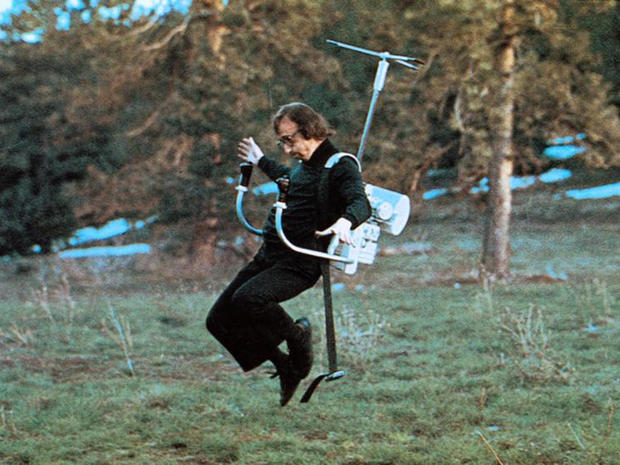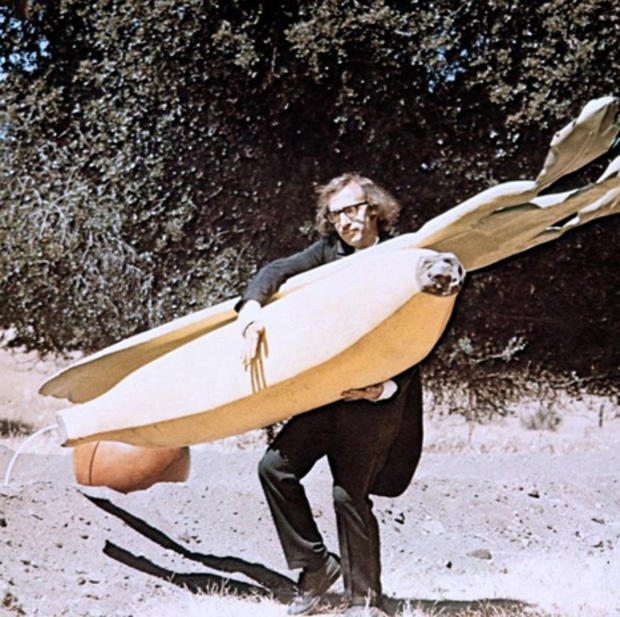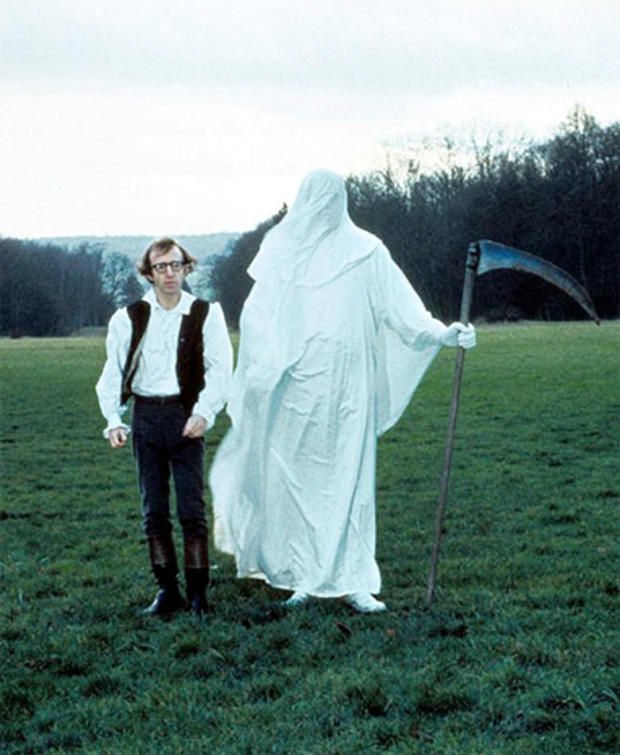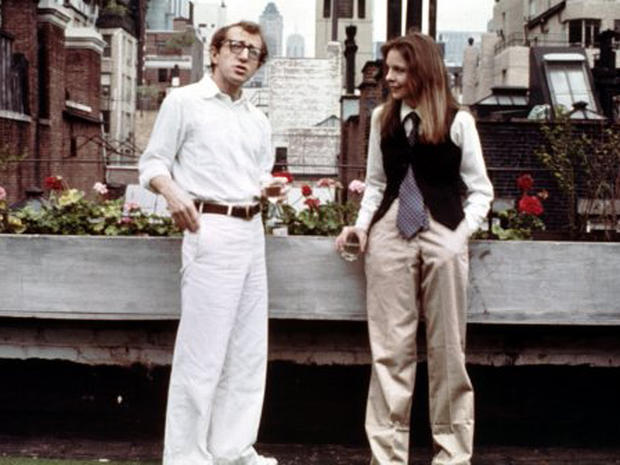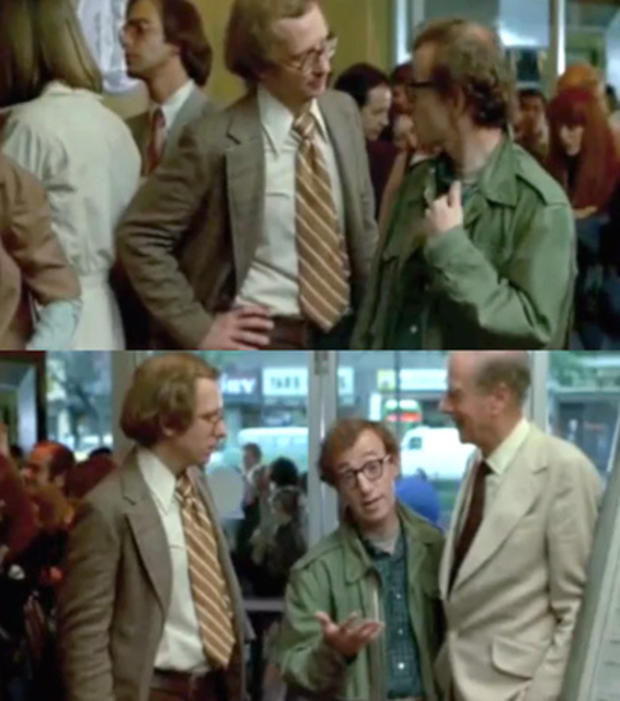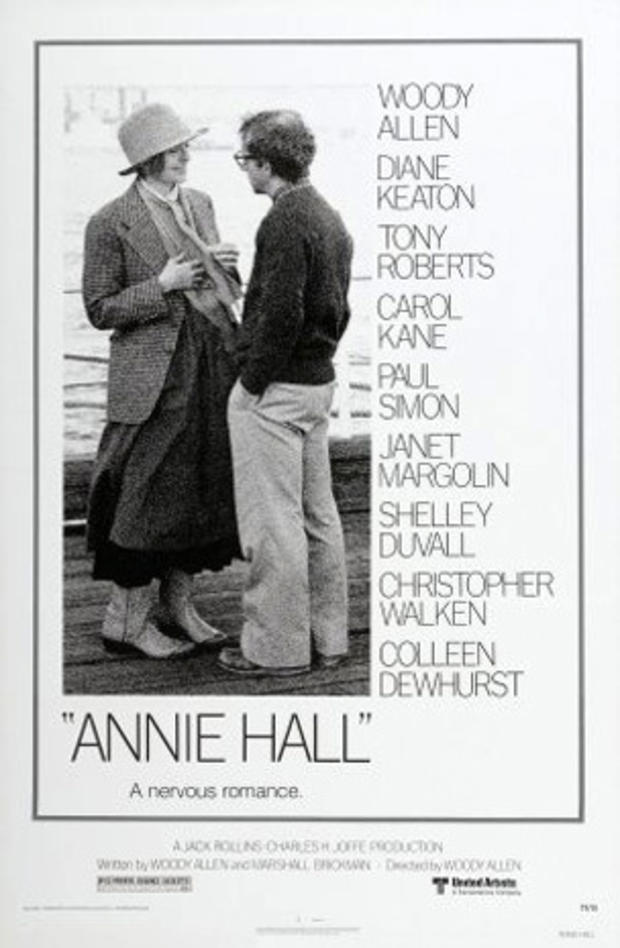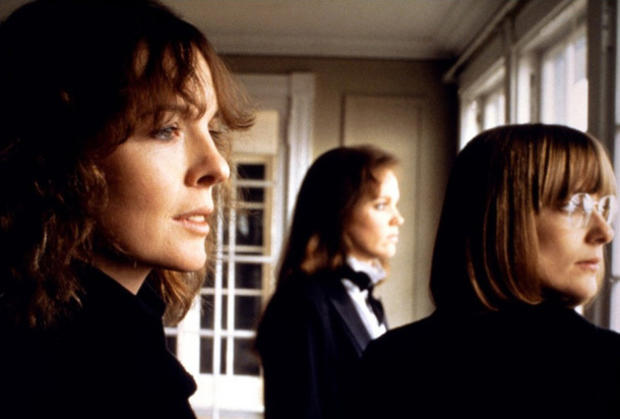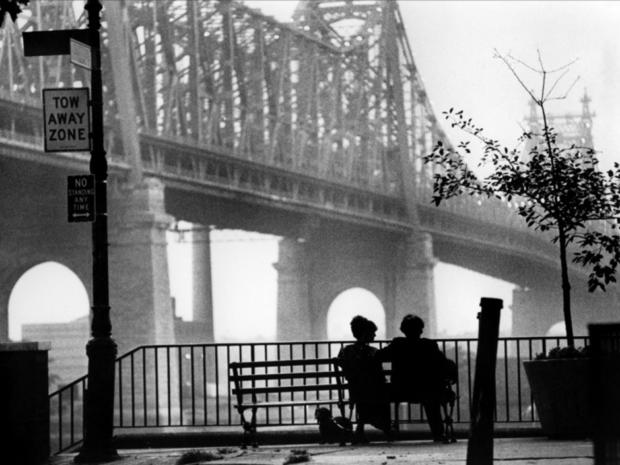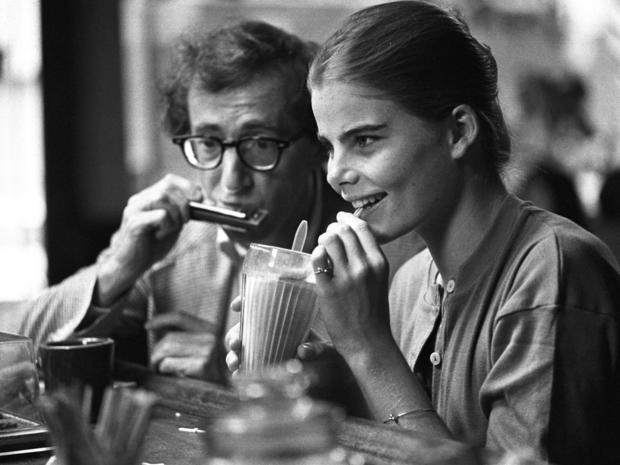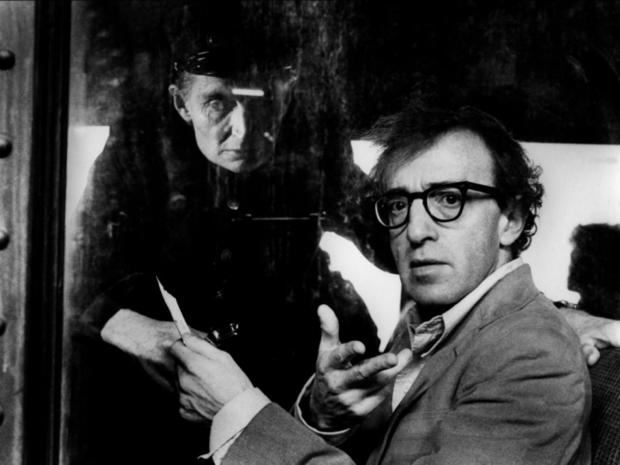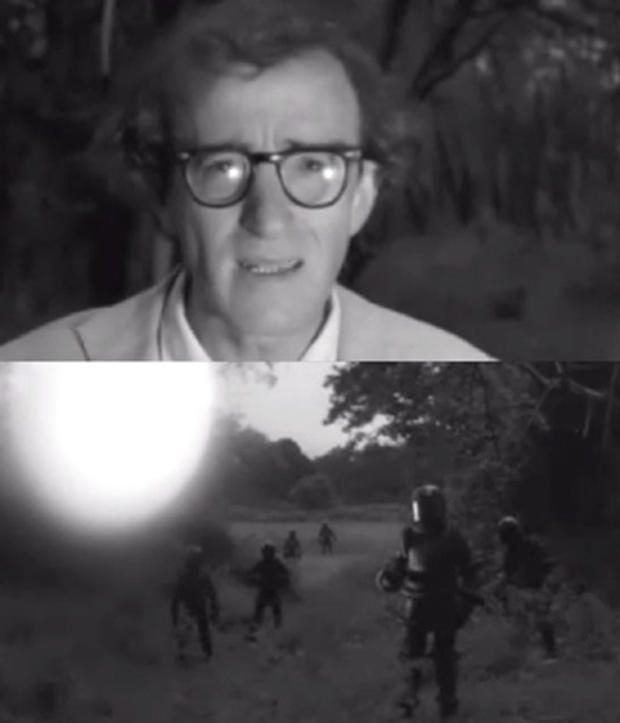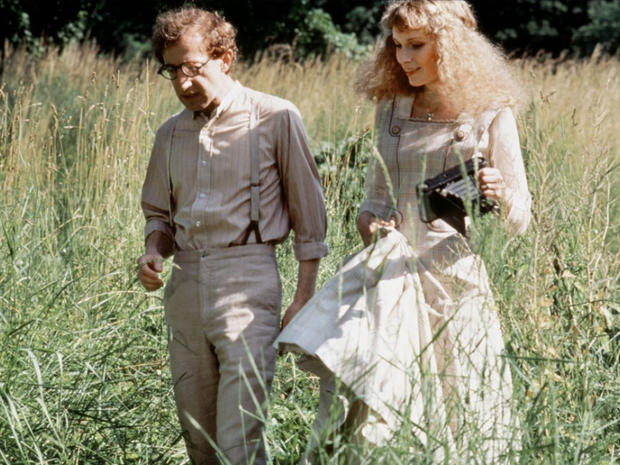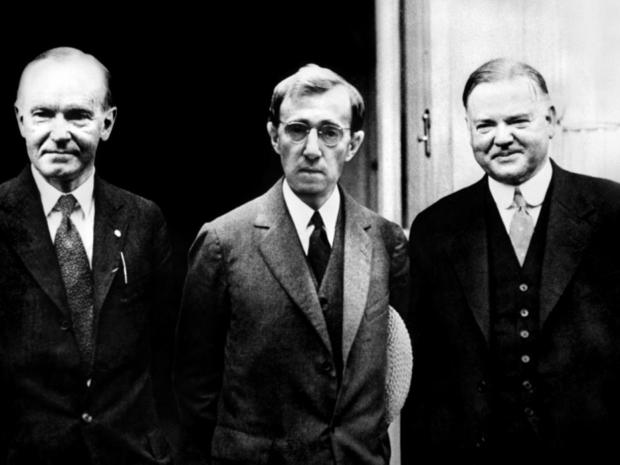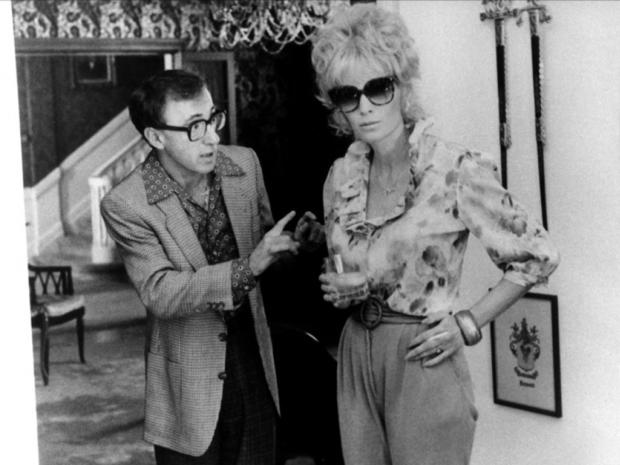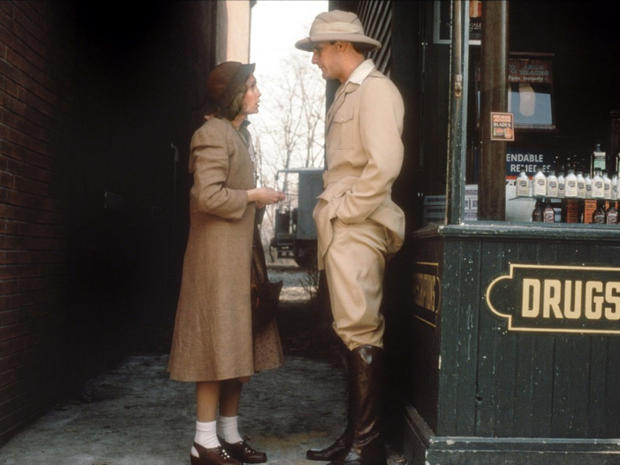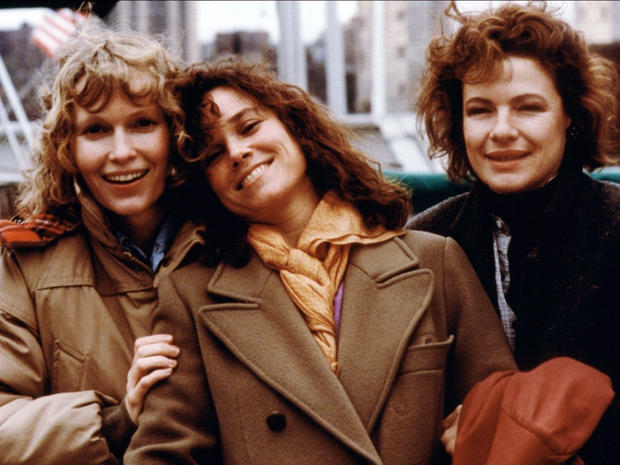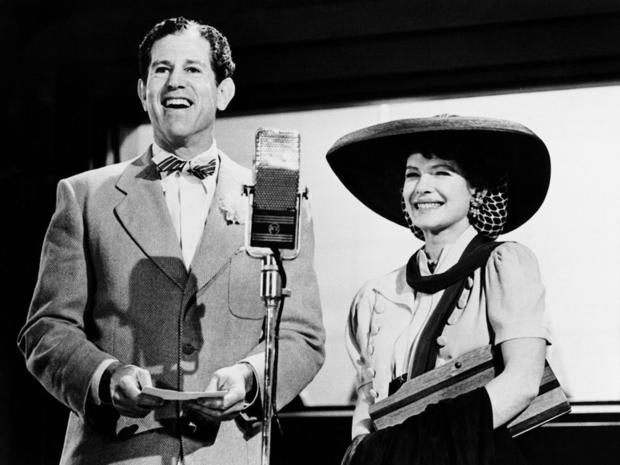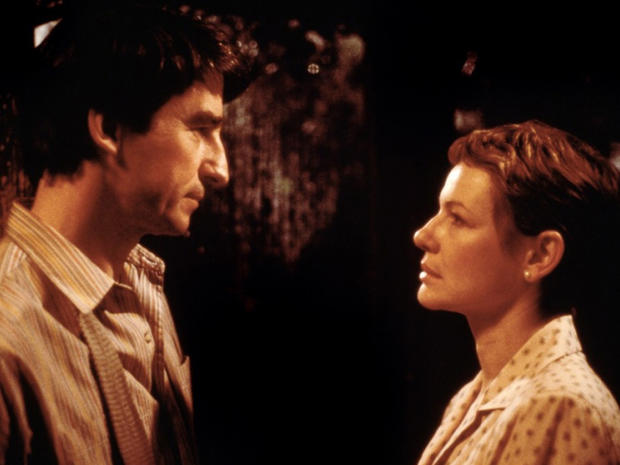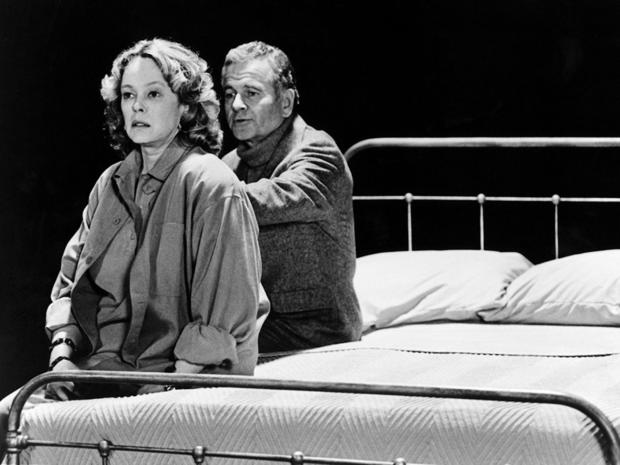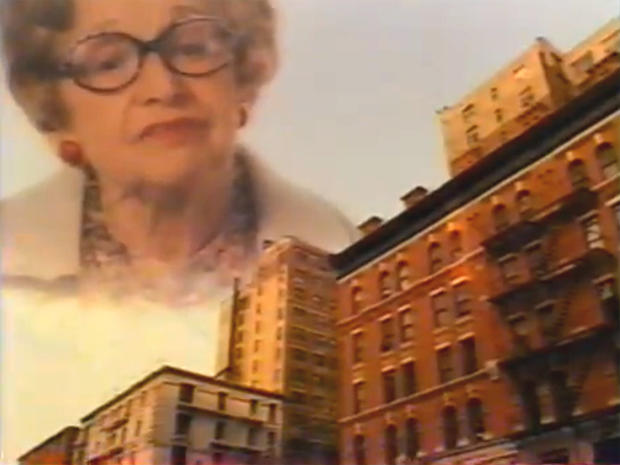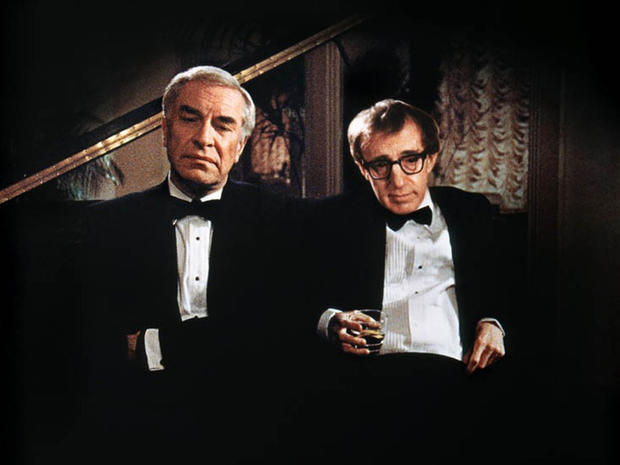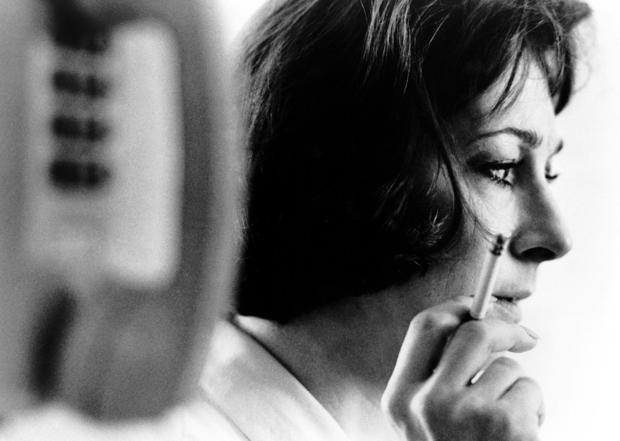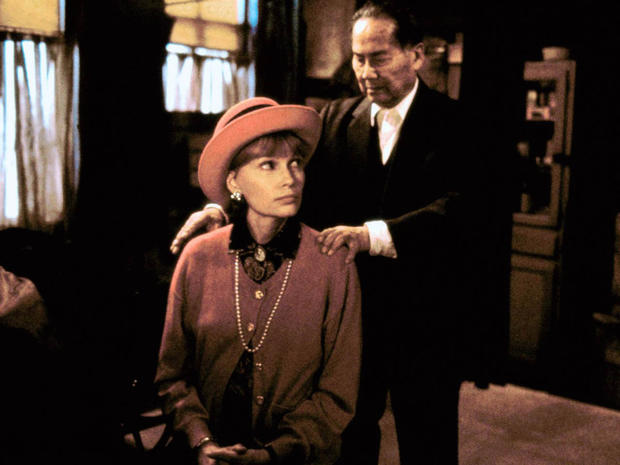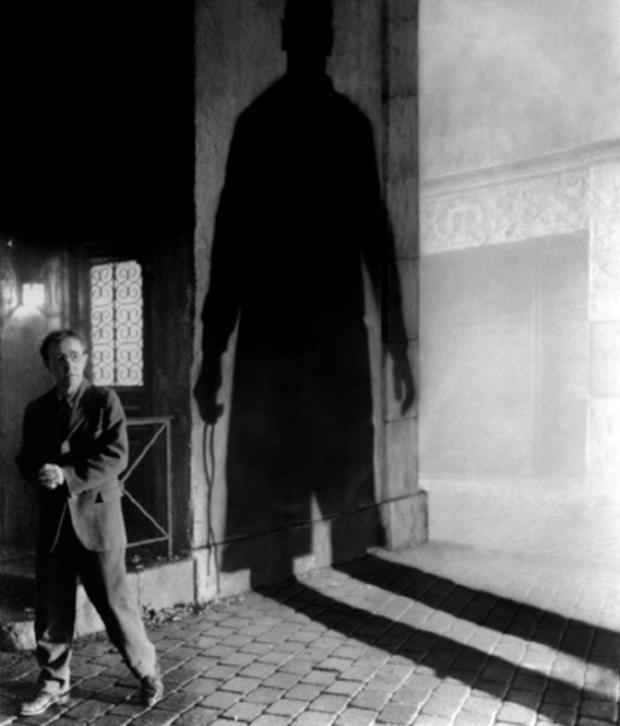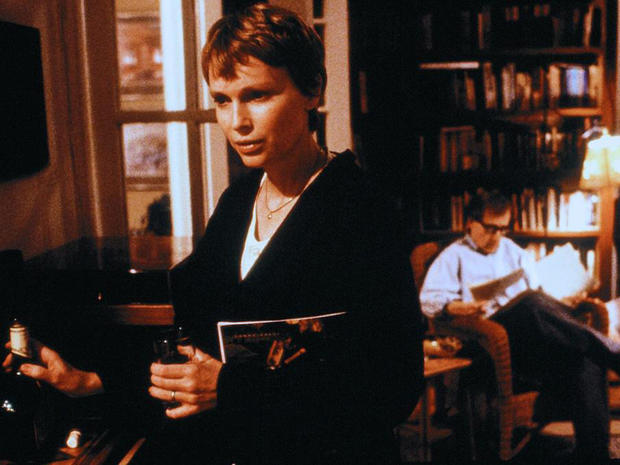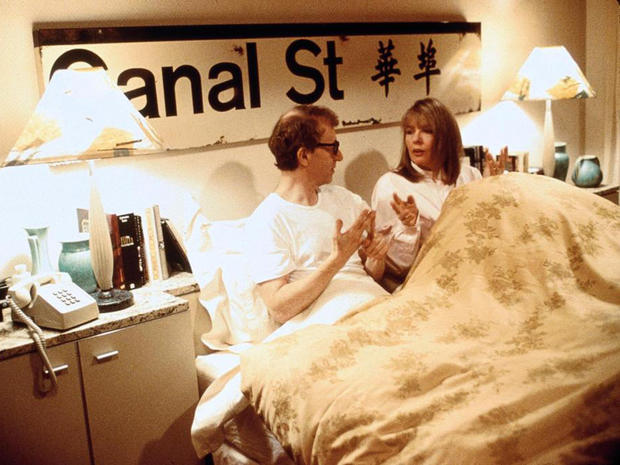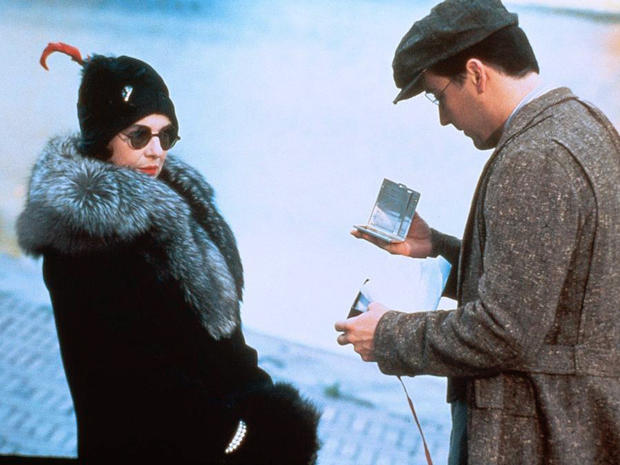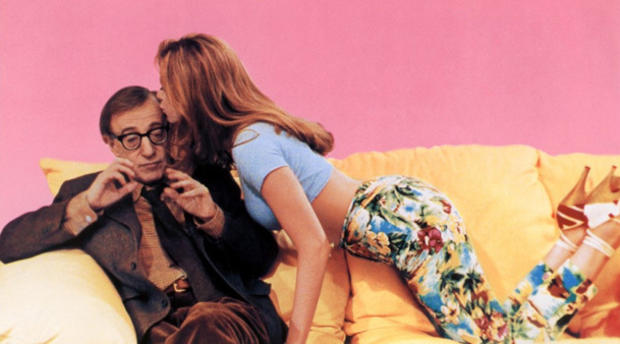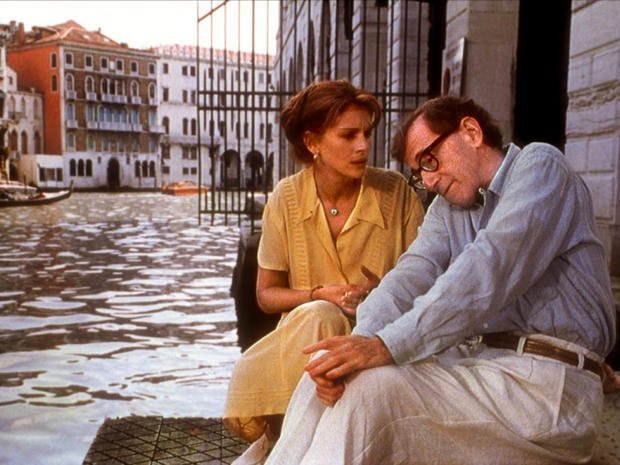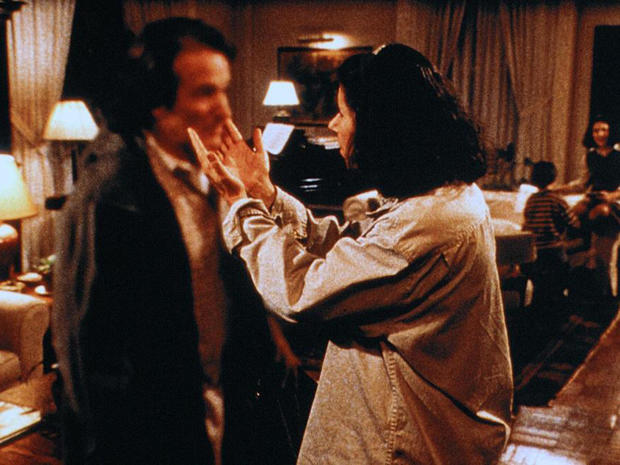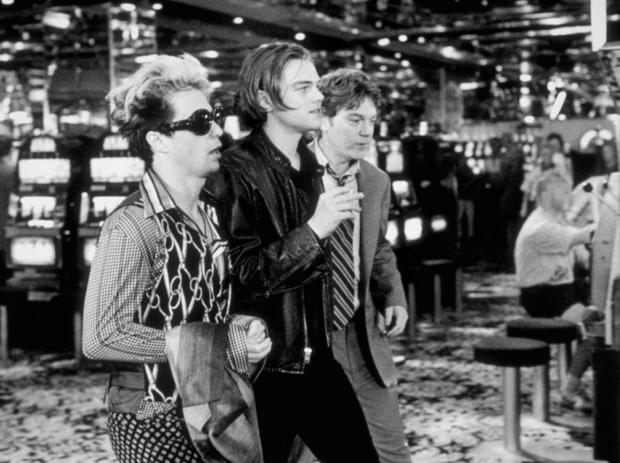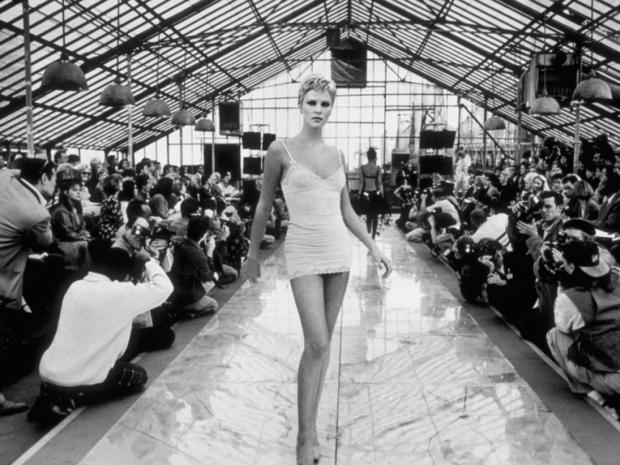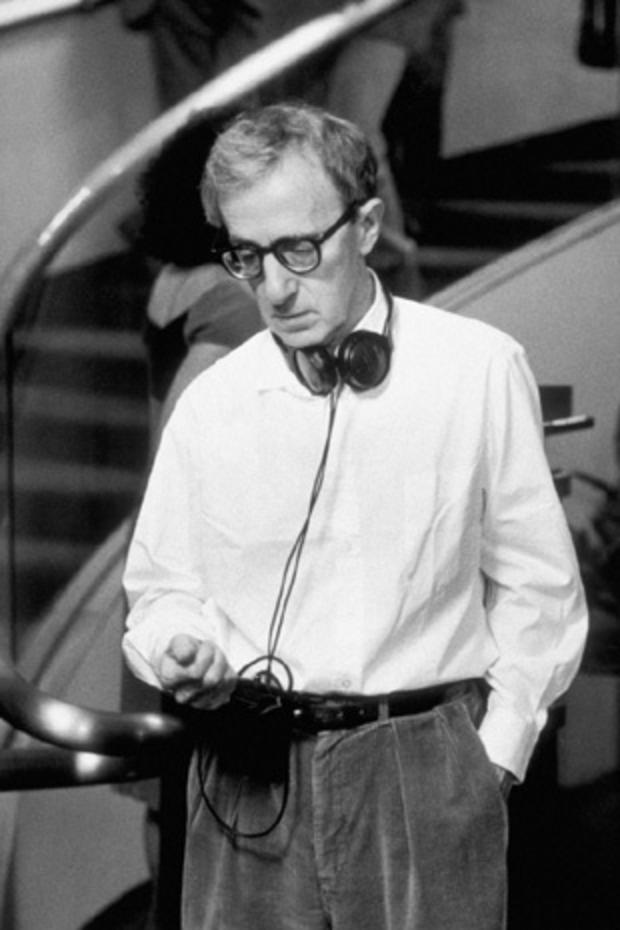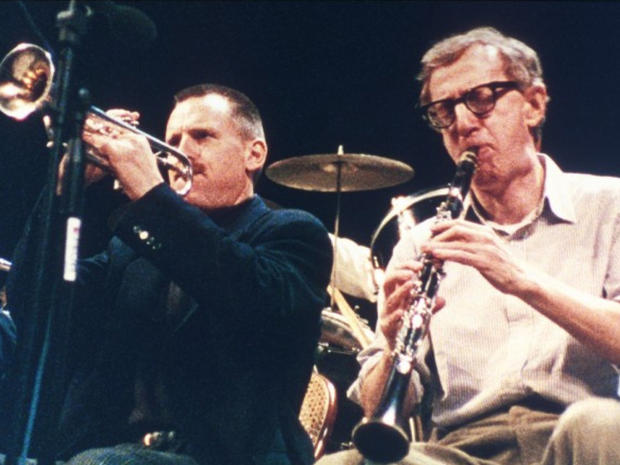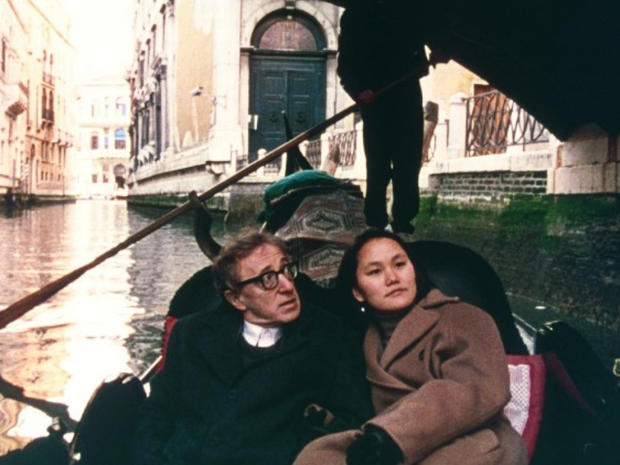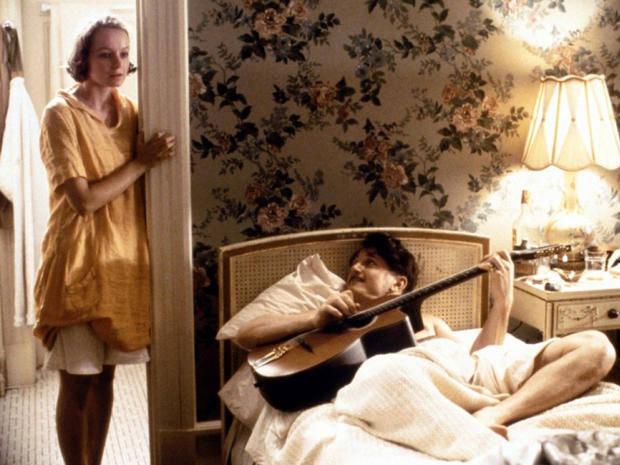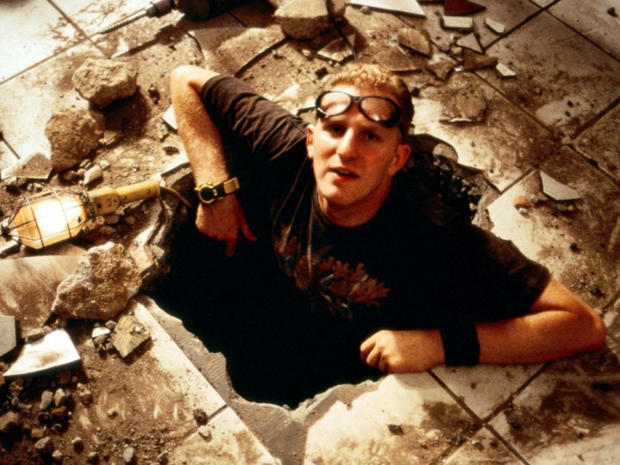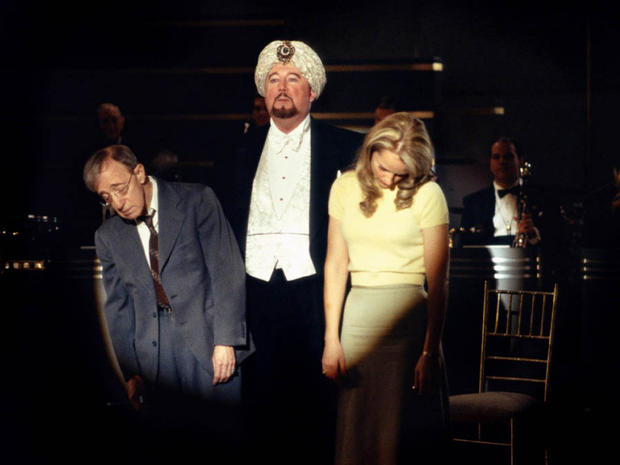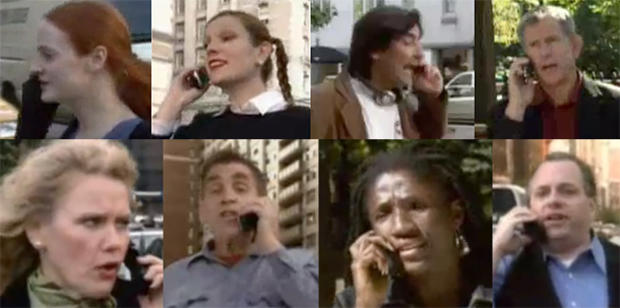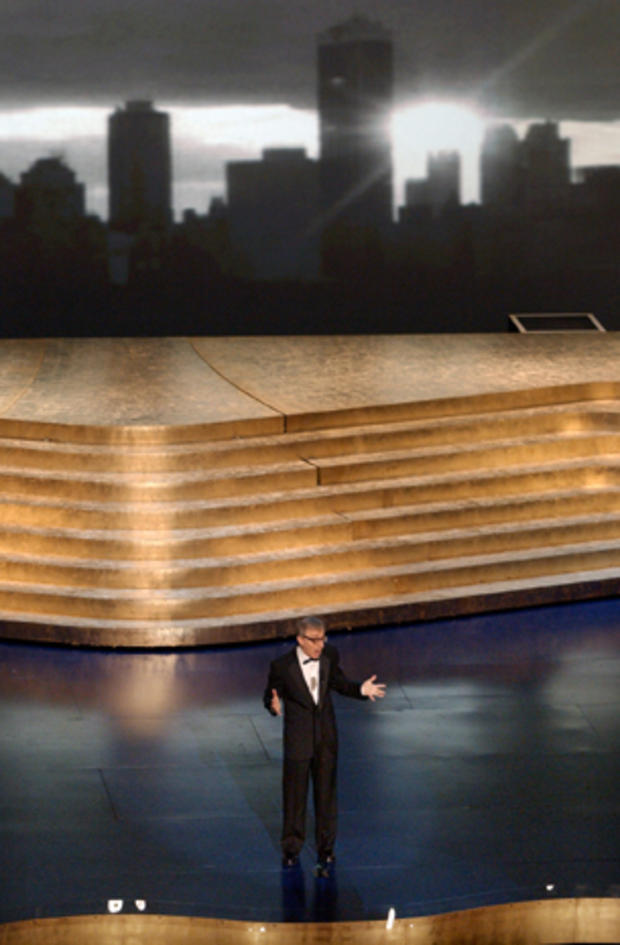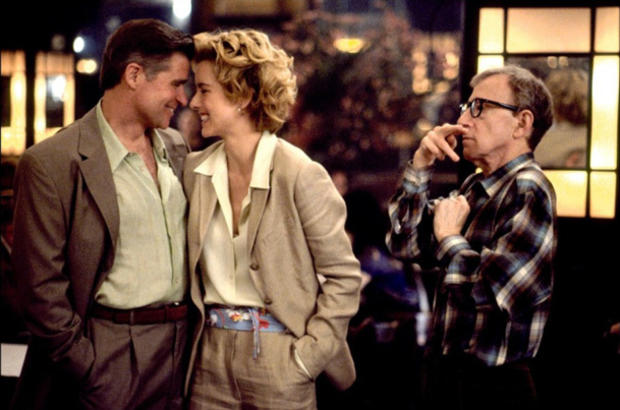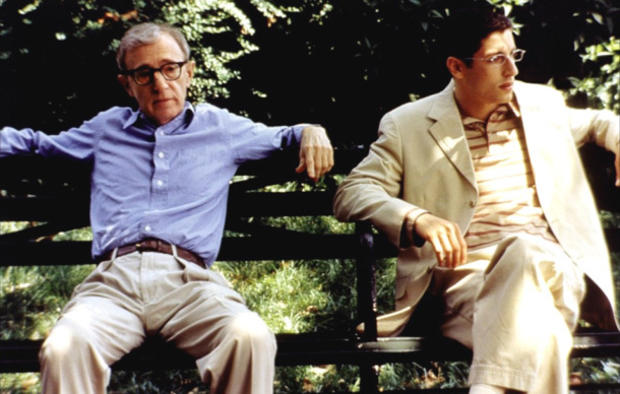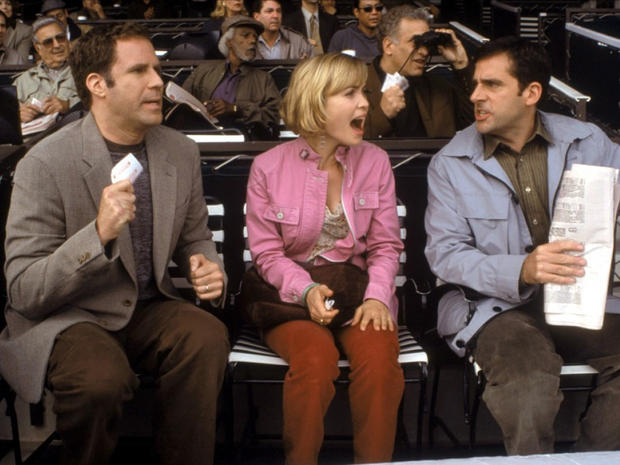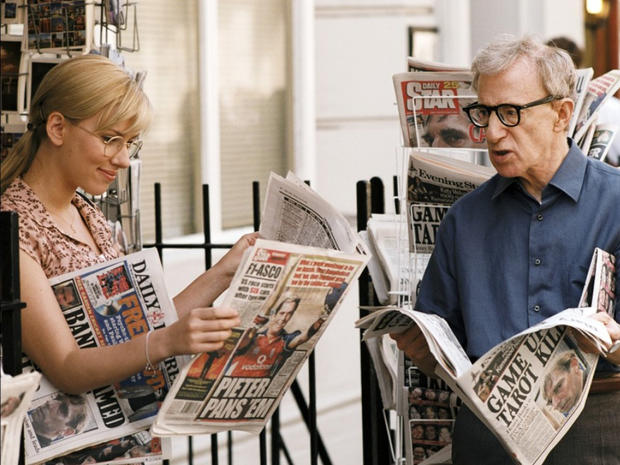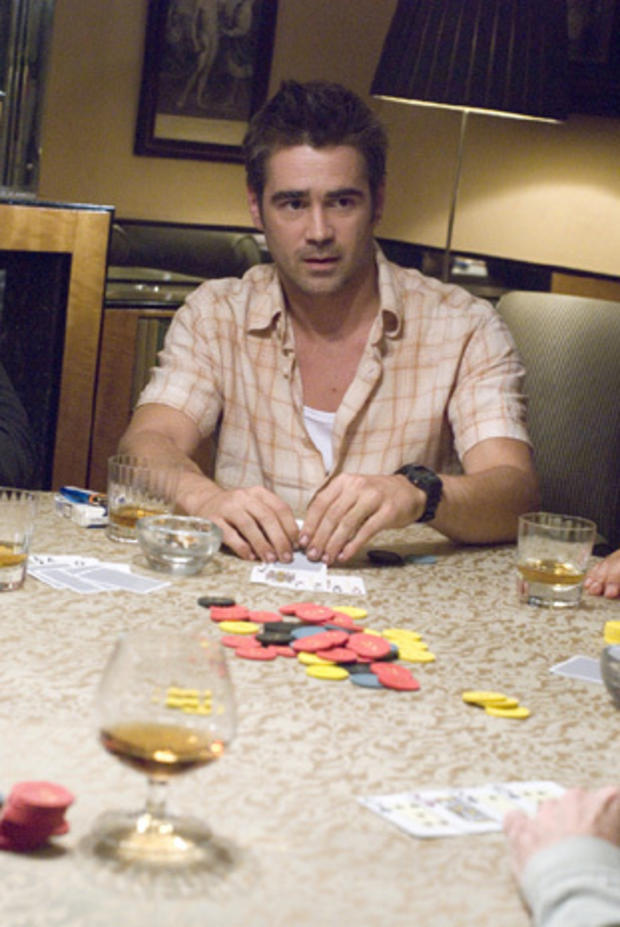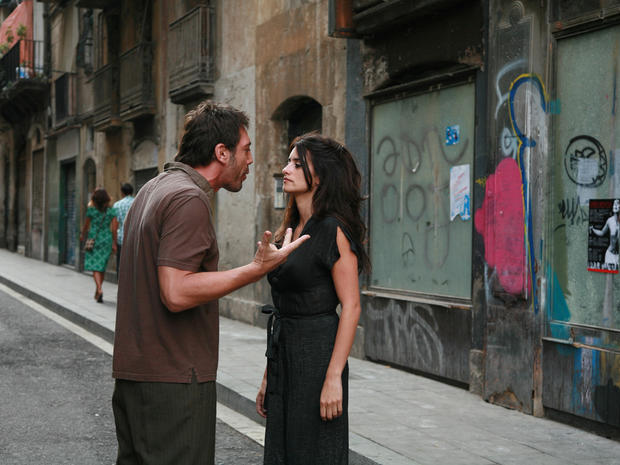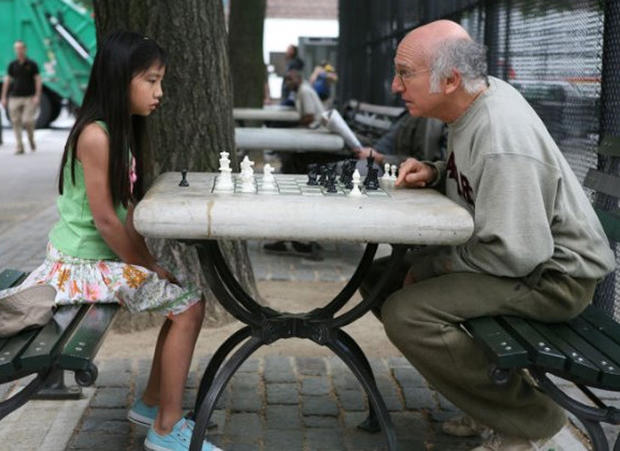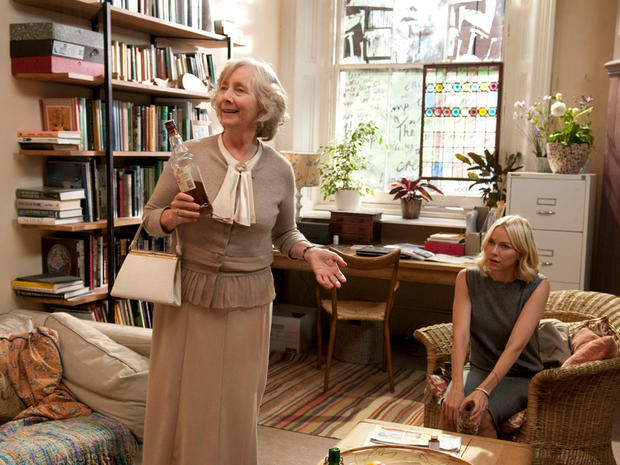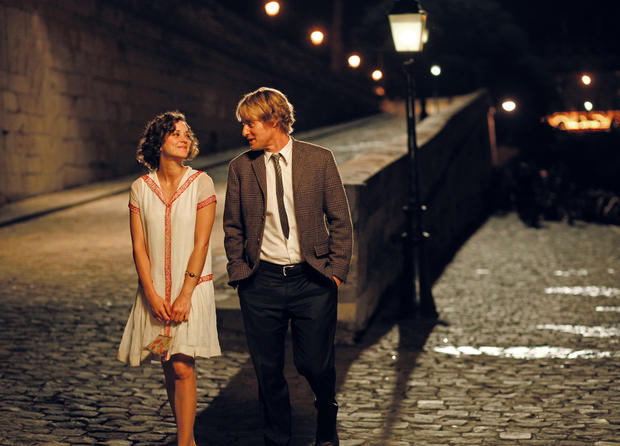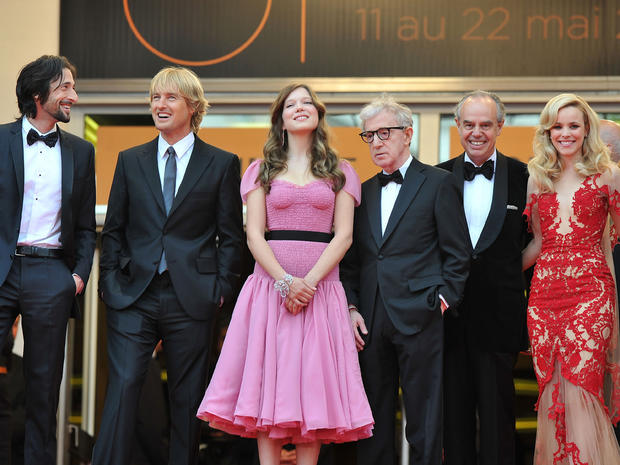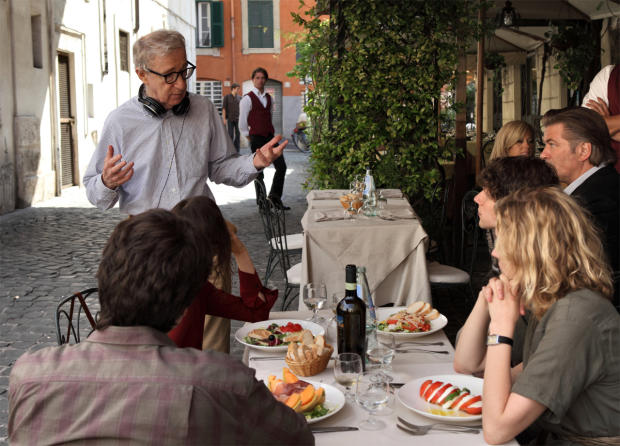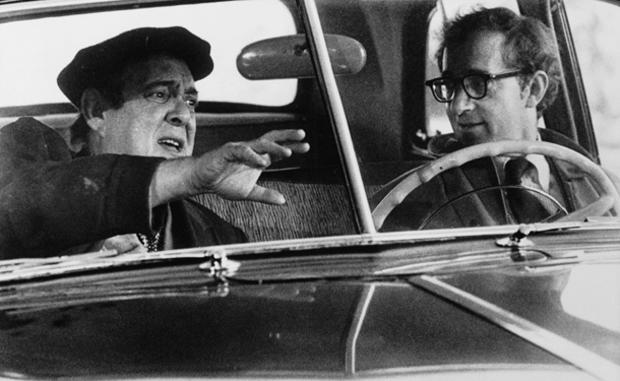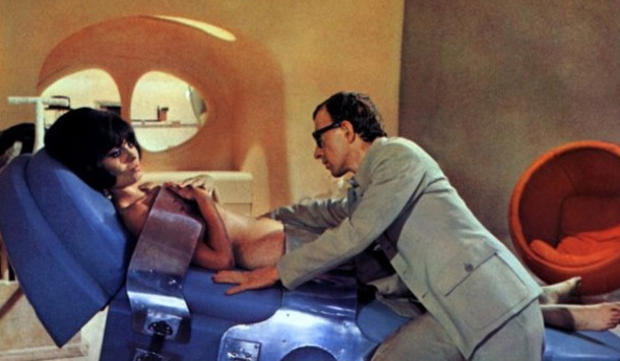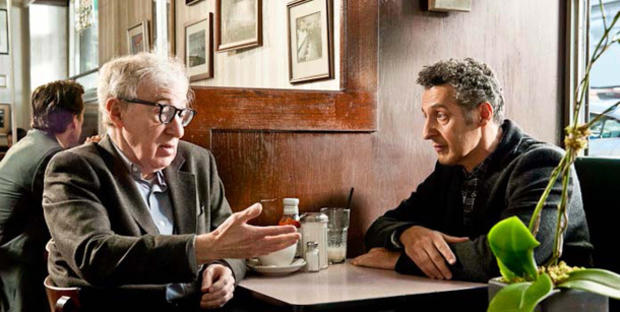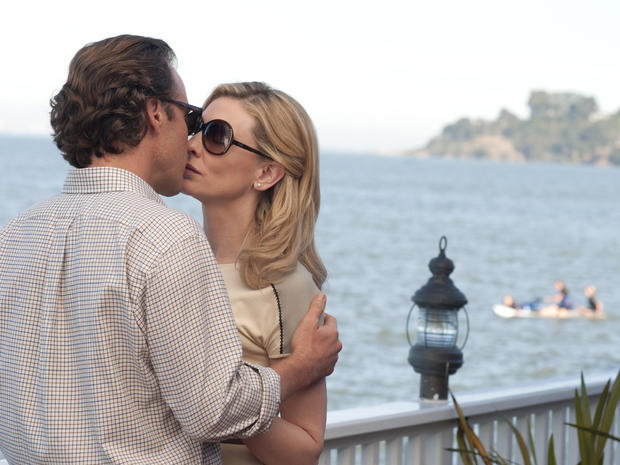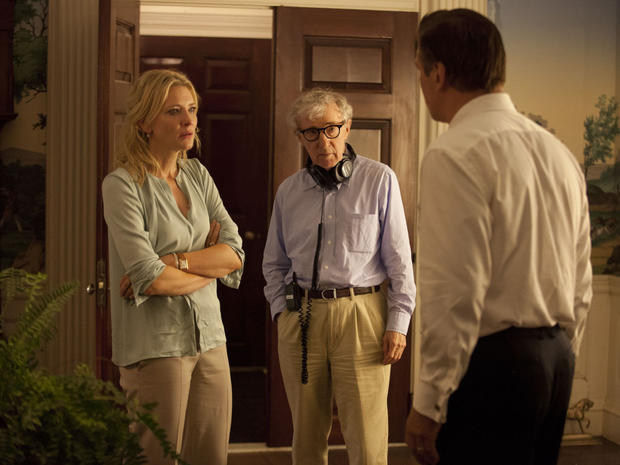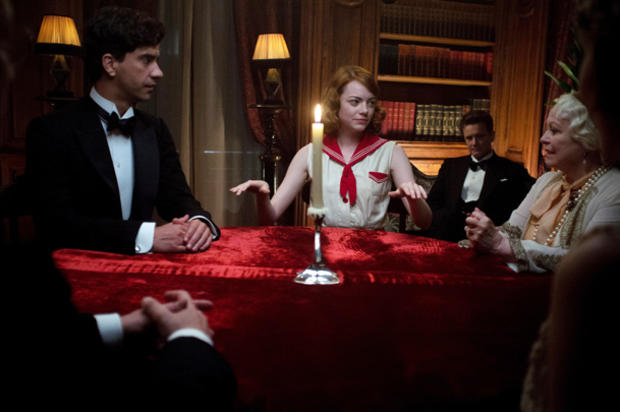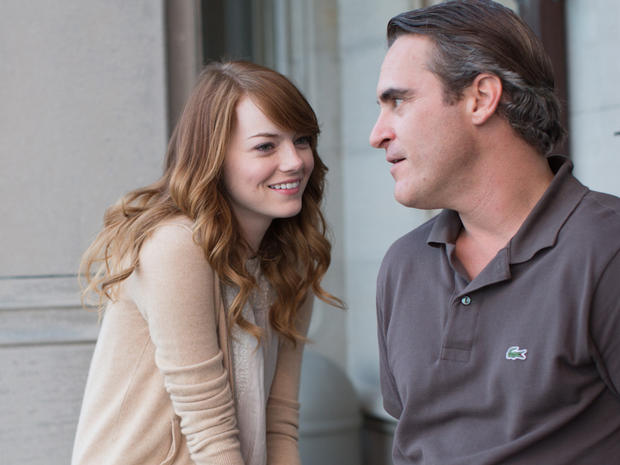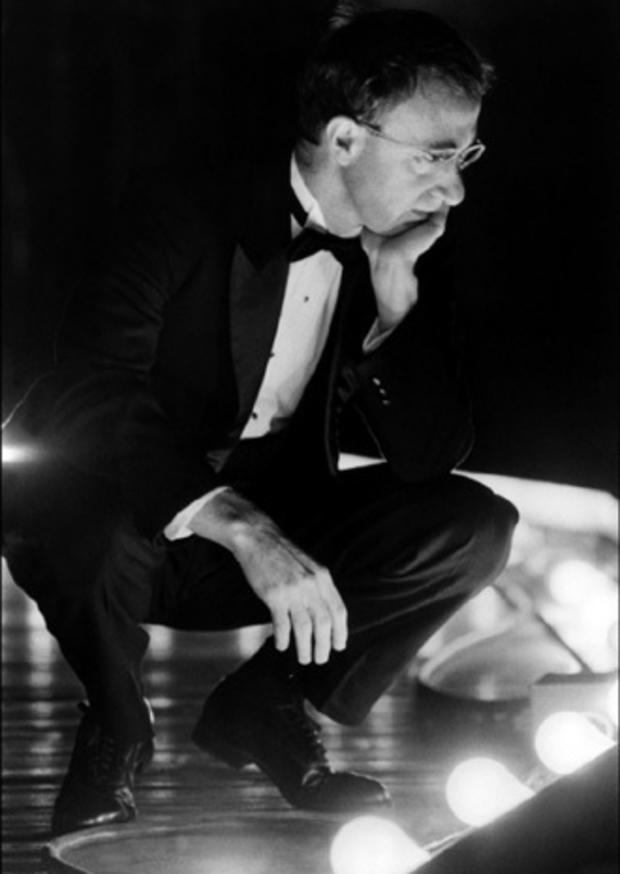The films of Woody Allen
Woody Allen filming the futuristic comedy "Sleeper."
Born in 1935 in New York, the TV comedy writer, standup comedian, film director and clarinet player is one of the most prolific filmmakers ever, creating more than 40 feature films over the past four-and-a-half decades. While his slapstick comedy has earned comparisons to Keaton and Chaplin, his comedies and dramas (many portraying the trials and tribulations of neurotic intellectuals in the city he loves most) have made him one of the most respected of filmmakers, with actors of every stripe eager to appear in his movies. (The 18 Oscar nominations earned by actors in Allen's films hasn't hurt, either.)
With the 2013 "Blue Jasmine," Allen has earned more Academy Award nominations (23, plus one for Best Actor) than any other writer-director.
By CBSNews.com senior producer David Morgan
"What's New, Pussycat?"
Woody Allen made his first film appearance co-starring with Peter O'Toole and Peter Sellers in "What's New, Pussycat?" It was also Allen's first screenplay.
O'Toole played a womanizer who just can't help but attract the attention of beautiful women - and when the beautiful women include Ursula Andress, Paula Prentiss, Romy Schneider and Capucine, it IS hard to resist.
"What's Up, Tiger Lily?"
In 1966 Allen was asked by a film distributor to write a comic script for a Japanese spy film, from the "International Secret Police" series, to be dubbed for an American TV audience. Released theatrically as "What's Up, Tiger Lily?" it turned what may have already been a ridiculous plot featuring plenty of scantily-clad females into one involving a stolen recipe for egg salad.
AIP padded the film without Allen's permission (including footage of The Lovin' Spoonful), expanding what was to have been an hour-long TV film into a movie release.
Trivia: The original film featured Akiko Wakabayashi (whose character is here called Suki Yaki), who would appear the following year in the James Bond film, "You Only Live Twice."
"Take the Money and Run"
Allen's first film as a director was "Take the Money and Run" (1969), an early form of "mockumentary" that traces the life of petty criminal Virgil Starkwell. The character's continuous bad luck extends from his extremely poor choice of instrument in a marching band (left), to passing unreadable notes to bank tellers. The film co-starred Janet Margolin.
Vincent Canby of The New York Times wrote the film is "the cinematic equivalent to one of Allen's best nightclub monologues, a kind of cowardly epic peopled with shy FBI agents, cons who are wanted for dancing with mailmen, over-analyzing parents and one lady blackmailer who has the soul of a Jewish mother - she likes to feed her victim good, hot meals."
"Play It Again, Sam"
"Play It Again, Sam" (1972), directed by Herbert Ross and based on Woody Allen's 1970 play, starred Allen as a divorced writer and film buff who receives dating advice from the ghost of Humphrey Bogart (Jerry Lacy).
It was Allen's first film teaming with Diane Keaton and Tony Roberts, who repeated their roles from the Broadway production.
"Bananas"
In 1971's "Bananas," Fielding Mellish (Woody Allen) becomes mixed up in a coup in a Latin American "banana republic." Why? To impress a girl, of course. Allen co-starred with his ex-wife, Louise Lasser.
Also among the cast was an uncredited Sylvester Stallone, who played a thug in a New York subway car.
"Everything You Always Wanted to Know About Sex*"
Unlike most bestselling books, "Everything You Always Wanted to Know About Sex* (*but were afraid to ask)" did not necessarily lend itself to movie adaptation. Woody Allen's 1972 film became a series of vignettes about the physical and emotional turmoils of love and procreation, including Allen's turn as a court jester seeking the favors of a Queen (left).
Also featured: Lou Jacobi as a cross-dresser; Gene Wilder as a man in love with a sheep; John Carradine as a mad scientist who creates a giant female breast; a game show in which contestants are quizzed on their perversions; and Allen as a spermatozoon readying for launch.
"Sleeper"
Waking up 200 years in the future, Woody Allen finds himself at the center of a revolutionary plot against the government, in a world in which cigarettes and red meat are considered healthy, in the 1973 comedy, "Sleeper."
"Sleeper"
An old joke - slipping on a banana peel - takes on new resonance as Woody Allen ventures into a garden of giant fruit in the futuristic comedy "Sleeper" (1973).
"Love and Death"
With music from Prokofiev by turns joyous and somber, Woody Allen romps through Napoleonic-era Russia in the comedy "Love and Death" (1975), featuring parodies of films by Bergman and Eisenstein.
It was Allen's second time directing Diane Keaton, as Sonja:
Boris: "Nothingness . . . non-existence . . . black emptiness . . ."
Sonja: "What did you say?"
Boris: "Oh, I was just planning my future."
"Annie Hall"
Allen's most resonant film was his greatest critical and popular film to date: "Annie Hall" (1977) told of the on-again, off-again romance between comedian Alvy Singer (Allen) and nightclub singer Annie Hall (Diane Keaton).
Allen played with movie conventions, using subtitles, split screens, flashbacks, even animation to depict the tribulations of love among New York neurotics, as Singer recalls his relationships with women, and the one that hurt the most.
"Annie Hall"
Few actors can get away with "breaking frame" - addressing the audience directly - but in "Annie Hall" (1977), Woody Allen (as Alvy Singer) memorably shuts up a man pontificating in the movie line about the work of media theorist Marshall McLuhan by pulling the real McLuhan out from off-camera.
McLuhan (to Columbia professor): "I heard what you were saying. You know nothing of my work. . . . How you ever got to teach a course in anything is totally amazing."
Alvy (to camera): "Boy, if life were only like this!"
"Annie Hall"
"Annie Hall" not only became Allen's biggest box office success to date; it also became that rare comedy to win an Academy Award for Best Picture. Allen also won for Best Director and Best Original Screenplay (with Marshall Brickman), and Diane Keaton won for Best Actress.
"Interiors"
Allen switched gears with his follow-up film, taking as his inspiration the works of Ingmar Bergman. "Interiors" (1978) starred Diane Keaton, Kristin Griffith and Mary Beth Hurt as sisters who witness the dissolution of their parents' marriage.
"Manhattan"
Diane Keaton and Woody Allen observe the 59th Street Bridge at dawn in "Manhattan" (1979). Filmed in glorious widescreen black-and-white by cinematographer Gordon Willis, it was as much a love story to New York City, set to the music of George Gershwin, as it was a tale of mis-matched lovers.
Ike: "I got a divorce because my ex-wife left me for another woman, okay?"
Mary: "God, that must have been really demoralizing."
Ike: "Well, I don't know, I thought I took it rather well under the circumstances. I tried to run them both over with a car."
"Manhattan"
Woody Allen played a middle-aged writer who has a romance with a 17-year old girl (Mariel Hemingway) in "Manhattan" ("I'm dating a girl who does homework!").
"Stardust Memories"
In "Stardust Memories" (1980) - like "Manhattan," shot in black and white by Gordon Willis - Woody Allen played a filmmaker who attends a retrospective of his work (where fans express adoration of his "earlier, funnier movies" compared to his current, more serious films).
"Stardust Memories"
Film director Sandy Bates (Woody Allen), who wants to move away from comedies to dramas with social import, encounters an alien, Og:
Sandy: "If nothing lasts, why am I bothering to make films, or do anything, for that matter?"
Og: "We enjoy your films. Particularly the early funny ones."
Sandy: "But shouldn't I stop making movies and do something that counts, like helping blind people or becoming a missionary or something?"
Og: "Let me tell you, you're not the missionary type. You'd never last. And incidentally, you're also not Superman, you're a comedian. You want to do mankind a real service? Tell funnier jokes!"
"A Midsummer Night's Sex Comedy"
Inspired by Bergman's "Smiles of a Summer Night," "A Midsummer Night's Sex Comedy" (1982) features Woody Allen as an inventor invited by his wife's cousin to spend a weekend in the country, where the host and assembled guests engage in a roundelay of elicit romances.
The film starred Mary Steenburgen, Jose Ferrer, Julie Hagerty, Tony Roberts and, for the first time, Mia Farrow (Diane Keaton was unavailable).
It would be the first of 13 films Farrow made with the director, with whom she would share a long, semi-domestic relationship.
"Zelig"
One of the absurdist comic's most winning films, "Zelig" (1983) was a fake documentary about an early 20th century curiosity: Leonard Zelig, a "human chameleon" who is able to change his appearance and behavior to mimic whomever he is near, from presidents (left) to baseball players to Harlem jazz musicians to psychiatrists.
New footage of Allen was expertly matched with newsreels, and the actor -- before digital FX of the "Forrest Gump" variety -- was cleverly cut into vintage footage of such figures as Babe Ruth and Adolf Hitler.
"Broadway Danny Rose"
Woody Allen played an agent of sub-par variety acts (a one-legged tap-dancer, a blind xylophonist) who becomes embroiled with the mob in the comedy "Broadway Danny Rose" (1984). It was his third film with Mia Farrow, who played Tina, a mobster's ex-mistress whose own marriage had fallen apart.
Danny: "What'd you do, you divorced him, or got a separation, or what?"
Tina: "Nah, some guy shot him in the eyes."
Danny: "Really? He's blind?"
Tina: "Dead."
Danny: "Dead. Of course, 'cause the bullets go right through."
"The Purple Rose of Cairo"
In "The Purple Rose of Cairo" (1985), Mia Farrow plays a Depression-era woman in a loveless marriage who seeks escape from her drab life at the movies. Her continued fascination with a B-movie confection, "The Purple Rose of Cairo," prompts one of the film's characters to step off the screen and into her life.
Panic fills the movie-within-a-movie in which other characters have been left behind, without their pith helmet-clad compatriot (played by Jeff Daniels) - as well as Hollywood star Gil Shepherd (also Daniels), who fears the "escape" of his screen persona will jeopardize his career.
"Hannah and Her Sisters"
Woody Allen won his third Oscar for his screenplay of "Hannah and Her Sisters" (1986), about three sisters (Mia Farrow, Barbara Hershey and Dianne Wiest) whose romantic entanglements blur the lines of propriety. Also featured were Michael Caine, Max Von Sydow, Carrie Fisher, Lloyd Nolan, Maureen O'Sullivan (Farrow's real-life mother), and Allen as a hypochondriac who considers changing his faith.
Both Caine and Wiest won Oscars as Best Supporting Actor and Actress.
"Radio Days"
"Radio Days" (1987) was Allen's evocative tribute to the Golden Age of Radio, when a young boy grows up in a pre-WWII New York City filled with the music, serials, quiz shows and news that marked a time of innocence and imagination.
Among the cast were Allen regulars Tony Roberts and Dianne Wiest (left), Mia Farrow, Julie Kavner, Danny Aiello, and, in a cameo, Diane Keaton.
"September"
In Woody Allen's "September" (1987), a drama colored by the work of Anton Chekhov, Sam Waterston plays a writer who is pulled between two women - Dianne Wiest (left), and her suicidal friend, played by Mia Farrow.
The return to drama by Allen was actually recast and reshot, after he'd originally filmed it with Sam Shepard in Waterson's role.
"Another Woman"
Sandy Dennis and Ian Holm in Woody Allen's "Another Woman" (1988), in which Gena Rowlands (playing Holm's wife) begins to reassess her life, her relationships, and the choices she's made, including staying in her stifling marriage.
"Oedipus Wrecks"
For the 1989 trilogy "New York Stories" (which also featured short films by Martin Scorsese and Francis Ford Coppola), Woody Allen directed "Oedipus Wrecks," in which a Jewish man's domineering mother (played by Mae Questel, who was the voice for Bettie Boop and Olive Oyl), disappears from inside a magician's trick box, only to reappear in the skies above Manhattan.
"Crimes and Misdemeanors"
One of Allen's most nuanced dramas, "Crimes and Misdemeanors" (1989) stars Martin Landau (left) as a successful doctor tries to extricate himself from a romantic affair that jeopardizes his marriage and public standing. Allen co-starred as a TV producer who is questioned by the doctor about a "hypothetical" moral quandary.
"Crimes and Misdemeanors"
Angelica Huston as the "other woman" in "Crimes and Misdemeanors" (1989).
"Alice"
In "Alice" (1990) Mia Farrow plays a married New Yorker who, seeking help in her relationships, visits an Oriental herbalist (Keye Luke). His "prescription" turns Alice invisible.
"Shadows and Fog"
Based on his one-act play, "Death," "Shadows and Fog" (1991) stars Woody Allen as a man caught in a Kafka-esque world in which a cowardly bookkeeper is coerced into hunting down a suspected murderer.
The style of the film is a tribute to German Expressionism.
"Husbands and Wives"
The struggles of married life coursed through the narrative of "Husbands and Wives" (1992), in which Woody Allen and Mia Farrow play a couple reacting to the breakup of their friends' marriage (played by Oscar nominee Judy Davis and Sydney Pollack). Their friends' failed relationship opens wounds in their own marriage, leading to infidelity, mistrust and dissolution.
The film's positive critical reception was overshadowed by the public breakup of Allen and Farrow over the director's affair with Farrow's adopted daughter, Soon-Yi Previn.
"Manhattan Murder Mystery"
Woody Allen reteamed with Diane Keaton in the comedy "Manhattan Murder Mystery" (1993), as a bickering couple who suspect their next-door neighbor is a killer.
Allen and Keaton's husband-and-wife posed an interesting idea: If Annie Hall and Alvy Singer hadn't parted ways, would they have ended up like this?
"Bullets Over Broadway"
Dianne Wiest won her second Best Supporting Actress Oscar for a Woody Allen film, playing the alcoholic leading lady of a Broadway production written by a starstruck young writer (Jon Cusack) whose best lines come from the real-life gangster backing his play, in "Bullets Over Broadway" (1994).
The film also received six more Academy Award nominations, for Best Supporting Actor (Chazz Palminteri), Best Supporting Actress (Jennifer Tilly), Best Director, Best Original Screenplay (Allen and Douglas McGrath), Best Art Direction-Set Decoration and Best Costume Design.
"Mighty Aphrodite"
In a tip to Allen's one-act play, "God," in which a Greek chorus taunts the protagonist, "Mighty Aphrodite" (1995) features a Greek chorus narrating what is surely an age-old story -- a man tries to raise a woman above the station of prostitute. Allen's co-star, Mira Sorvino, won an Oscar for Best Supporting Actress.
Greek Chorus Leader: "Don't go any further. I know what you're thinking, Lenny, and forget it!"
Lenny: "I can't forget it; the thought's been put in my head."
Chorus: "Oh, cursed fate! Certain thoughts are better left unthunk."
"Everyone Says I Love You"
Woody Allen's ode to musicals, "Everyone Says I Love You" (1996), is a romantic comedy set in New York, Venice and Paris, featuring Allen, Julia Roberts, Alan Alda, Ed Norton, Drew Barrymore, Tim Roth, Goldie Hawn and Natalie Portman.
Among the standards belted out by a cast not used to singing are Cole Porter's "Looking at You," "Makin' Whoopee," "All My Life," "My Baby Just Cares For Me," and "Enjoy Yourself (It's Later than You Think)," which is sung by ghosts in a funeral parlor.
"Deconstructing Harry"
In "Deconstructing Harry" (1997), an obsessed writer (is there any other kind?) uses the people in his life as inspiration for his stories, some of which are charmingly absurdist. In one piece, Robin Williams pays a man who becomes out of focus to those around him.
"Celebrity"
Kenneth Branagh (far right) plays a writer who immerses himself in the world of celebrity journalism in Woody Allen's 1998 bitter comedy, "Celebrity." Featured are Leonardo DiCaprio (just off the success of "Titanic") in a bit of self-parody as teen idol Brandon Darrow, and Sam Rockwell.
Also in the game cast are Judy Davis, Hank Azaria, Winona Ryder, Melanie Griffith, Famke Janssen, Michael Lerner, Joe Mantegna, Bebe Neuwirth, and a cameo by Donald Trump.
"Celebrity"
Charlize Theron in "Celebrity" (1998).
"Celebrity"
Woody Allen on the set of "Celebrity."
"Wild Man Blues"
The films directed by Allen following his very public breakup with Mia Farrow and marriage to Soon-Yi Previn were a mix of lush romanticism and bitter cynicism. But another, unique look at the filmmaker's artistry and life came by way of Barbara Koppel's 1997 documentary, "Wild Man Blues," which followed the clarinetist and his ragtime band on a European tour.
"Wild Man Blues"
"Wild Man Blues" not only cast a light on Allen's passion for music, but also opened a window onto his relationship with his wife, Soon-Yi, who in the film is seen as a strong, take-charge figure in his life.
"Sweet and Lowdown"
Sean Penn played a peripatetic, jive-talking blues man -- the "second-greatest jazz guitarist" -- in "Sweet and Lowdown" (1999).
Both Penn and Samantha Morton, who played his love interest -- and who was mute throughout the entire film -- received Academy Award nominations for their performances.
"Small Time Crooks"
The best-laid plans rarely go as planned in an Allen film. When a gang of crooks rents a restaurant into order to tunnel into a neighboring bank's vault, their digging comes to naught -- but their cover operation -- selling cookies -- makes them rich. "Small Time Crooks" (2000) featured a cast that included Allen, Tracey Ullman, Elaine May, Elaine Stritch, Hugh Grant, Michael Rapaport, Tony Darrow, Jon Lovitz and Larry Pine.
"The Curse of the Jade Scorpion"
A stage hypnotist places a curious spell upon Woody Allen and Helen Hunt - to become jewel thieves - in the screwball comedy "The Curse of the Jade Scorpion" (2001). The cast also included David Ogden Stiers, Dan Aykroyd and Charlize Theron.
"Sounds From a Town I Love"
In a short film produced for "The Concert for NYC" in the wake of the September 11 attacks, Woody Allen's "Sounds From a Town I Love" listens in to cell phone conversations that convey the hysteria, paranoia, and assorted neuroses that make New Yorkers New Yorkers. Examples:
Man: "I got mugged! I was coming home from the opera, they took my gas mask, my flash light ... "
Woman: "Well, we're SO wrong for each other. But that's not the only attraction ... "
Woman: "She didn't get into the right preschool, which means she won't get into a good private school, which means she'll never get into Ivy League college, she won't get a good job. I mean, She's three years old, her life is finished!"
Man: "When all this is over and there's a new government in Afghanistan, we come in with Starbucks."
Academy Awards
At the Oscars broadcast on March 24, 2002, Woody Allen - who has pointedly stayed away from the annual awards ceremony, despite having been nominated more frequently than any other writer-director - made a surprise appearance to introduce a film tribute to post-9/11 New York City.
"Thank you very much," he said after receiving a standing ovation. "That makes up for the strip search.
"About four weeks ago I was sitting home in my apartment in New York and the phone rang and a voice on the other end said, 'This is the Motion Picture Academy of Arts & Sciences.' And I panicked immediately, because I thought that they wanted their Oscars back . . . because the pawn shop has been out of business for ages."
"Hollywood Ending"
In "Hollywood Ending" (2002), Woody Allen plays a director on the downward spiral in need of a hit, who accepts the task of directing a film starring his ex-wife (Tea Leoni), produced by the man who "stole" her from him (Treat Williams).
"Anything Else"
In "Anything Else" (2003), Jason Briggs plays a young man who seeks advice from an aging oracle of wisdom (Woody Allen) on winning the girl of his dreams (played by Christina Ricci).
Dobel (Allen): "We live in perilous times. You got to keep alert for these things. You don't want your life to wind up as black-and-white newsreel footage scored by a cello in a minor key."
"Melinda and Melinda"
When comparing tragedy and comedy, Mel Brooks once said, "Tragedy is when I cut my finger. Comedy is when you fall into an open sewer and die."
In 2005's Melinda and Melinda," Woody Allen retells a story twice, each time featuring a young woman (Radha Mitchell) whose experience is related both as comedy and as tragedy. Among the cast are Will Ferrell and Steve Carrel (left), Amanda Peet, Chloe Sevigny and Wallace Shawn.
"Match Point"
The first of what would be a string of films shot in Europe, "Match Point" (2005) was a distinct change of pace for Woody Allen - a thriller involving a striving tennis instructor (Jonathan Rhys-Meyers) whose marriage to a woman of means (Emily Mortimer) is jeopardized by his passionate affair with another woman (Scarlett Johansson).
The film's location was easily transferred to London from the Hamptons when Allen obtained U.K. financing.
"Scoop"
Woody Allen teamed up with Scarlett Johansson again in "Scoop" (2006), a lighter mystery also filmed in London, in which an investigative reporter is joined by a stage magician to track down the mysterious Tarot Card Killer.
"Cassandra's Dream"
In the thriller "Cassandra's Dream," (2007), shot in the U.K., Colin Farrell plays a man whose gambling debts will be forgiven if in return he helps carry out a murder. Ewan McGregor, Tom Wilkinson and Sally Hawkins co-star.
"Vicky Cristina Barcelona"
In the 2008 romantic comedy "Vicky Cristina Barcelona," a pair of young American women visiting Spain (Scarlett Johansson and Rebecca Hall) become entangled with a sensual Spanish artist and his equally sensual and fiery ex-wife (played by Javier Bardem and Penelope Cruz, left).
The movie was one of Allen's biggest box office hits, and Cruz won an Academy Award for Best Supporting Actress.
"Whatever Works"
In 2009, as an actors' strike was looming, Woody Allen pulled out a script he'd written in the early 1970s for Zero Mostel about a misanthropic chess teacher, called "Whatever Works," and roped in Larry David ("Curb Your Enthusiasm") to play the role.
"You Will Meet a Tall Dark Stranger"
Gemma Jones, whose decades-long marriage has ended in divorce, begins meeting with a fortune teller whose rosy forecasts give Jones hope to cling to, despite the belief by her daughter (played by Naomi Watts) that the tarot reader is a quack, in "You Will Meet a Tall Dark Stranger" (2010), directed by Woody Allen.
"Midnight in Paris"
Allen's biggest box office success was the 2011 film "Midnight in Paris," a romantic fantasy in which a young writer (Owen Wilson) steeped in nostalgia for the Paris of the 1920s suddenly finds himself making nightly sojourns to that very place. He crosses paths with Ernest Hemingway, F. Scott Fitzgerald, Gertrude Stein, and other denizens of the Left Bank, including Picasso's mistress, Adriana (Marion Cotillard).
Gil: "I get in a car and I slide through time."
Man Ray: "Exactly correct. You inhabit two worlds. So far I see nothing strange."
Gil: "Yeah, you're surrealists. But I'm just a normal guy."
Allen won his fourth Oscar for his screenplay; the movie also earned three other Academy Award nominations, including Best Picture, Best Director and Best Art Direction.
"Midnight in Paris"
From left: Adrien Brody, Owen Wilson, Lea Seydoux, Woody Allen, Frederic Mitterrand and Rachel McAdams attend the "Midnight in Paris" premiere at the 64th Cannes Film Festival on May 11, 2011, in Cannes, France.
Allen called the critical and popular reception of "Midnight in Paris" a "happy accident."
"I had no idea why everyone embraced the picture so enthusiastically," he said in 2012. "You make a movie, and some pictures they like a little bit, some they like a lot, some they don't like at all. It's very capricious, a complete mystery to me. To me ['Midnight in Paris'] is no more an appealing picture than 'Vicky Cristina Barcelona' or 'Match Point' or 'Annie Hall' or 'Husbands and Wives.' "
"To Rome With Love"
For the seventh time in seven years Allen directed a movie in a European city: the 2012 omnibus, "To Rome With Love." One of the film's disconnected tales features Alec Baldwin as a successful architect dispensing advice (usually ignored) to a young architecture student (Jesse Eisenberg) caught in a romantic triangle with Greta Gerwig and Ellen Page.
"I could have done that in New York," Allen admitted, but he found the element of strangers visiting another city intriguing.
Two stories in particular capture the director's absurdist humor: One involves a gifted amateur singer of opera, who is incapable of producing a beautiful voice unless he is singing in the shower. Another stars Roberto Benigni ("Life Is Beautiful") as a boring, middle-class office worker who wakes up one morning to discover he's famous - prey for paparazzi and voluptuous women.
"The Front"
Allen has rarely taken acting assignments, but there are a few standout films among his resume of acting in other directors' films. Among them is Martin Ritt's 1976 comedy-drama of the McCarthy Era, "The Front."
Allen plays a restaurant worker who agrees to be the name for a blacklisted writer (Zero Mostel).
"Casino Royale"
The zany madcap standup comic played a zany, madcap James Bond - one of several "Bonds" meant to draw attention away from the REAL James Bond, played by David Niven - in the 1967 satire, "Casino Royale."
"Fading Gigolo"
Woody Allen takes another rare acting role in a film written and directed by John Turturro, "Fading Gigolo" (2013). Allen plays a failing bookseller who convinces Turturro to take up the world's oldest profession as a way to revive their fortunes, with Allen embarking on a new career as his pimp.
"Blue Jasmine"
Peter Sarsgaard and Cate Blanchett in "Blue Jasmine" (2013), written and directed by Woody Allen.
Blanchett plays the socialite-wife of a Bernie Madoff-like financial whiz (Alec Baldwin), whose crash-and-burn leads to Jasmine returning to her declasse family to put her life back together.
The film costars Bobby Cannavale, Louis C.K., Andrew Dice Clay, Sally Hawkins and Michael Stuhlbarg.
"Blue Jasmine"
Left: Director Woody Allen on the set of "Blue Jasmine," with Cate Blanchett and Alec Baldwin.
Blanchett told CBSNews.com's Ken Lombardi that she accepted the role before even reading the script, based on his track record. She had nothing to worry about. "Apart from being an extraordinary, legendary filmmaker, he's an amazing dramatist. And so the screenplay was beautifully structured," she said. "[Jasmine is] a complex character, and a really unreliable narrator. She's a serial liar and you can't really believe what she says. And that's a really fun, interesting thing to play."
Allen received his 16th Oscar nomination for Best Original Screenplay. In addition to Sally Hawkins' Oscar nomination for Best Supporting Actress, Blanchett received the Academy Award for Best Actress for her performance.
"Magic In the Moonlight"
In the romantic comedy "Magic In the Moonlight" (2014), Emma Stone plays a clairvoyant who brings intrigue to the 1920s French Riviera - and stirs the skepticism of a stage illusionist played by Colin Firth.
"Irrational Man"
A blend of romance and crime, the comedy-drama "Irrational Man" (2015) stars Joaquin Phoenix as a philosophy professor at a New England college who undergoes an existential crisis - one be believes can only be resolved by committing an act of murder. Costarring Emma Stone and Parker Posey.
"Zelig"
In 2010 Woody Allen said that work "keeps me from sitting home and obsessing morbidly. If I just got up in the morning and had no place to go and was retired or something, I would sit there and I would be thinking . . . Gee, what is the purpose of life? Why are we all finite? Why do we get old and die? Is there nothing out there? It's so tragic, why do our loved ones perish? Why do we degenerate?
"Who wants to think about that stuff?"
Instead, he worries about solving the problems of moviemaking, like picking the right actors. "And if you don't solve them," he said, "what's the worst that happens? You have a bad movie - but you don't die!
That, Allen said, "is why I keep making movies."
By CBSNews.com senior producer David Morgan
